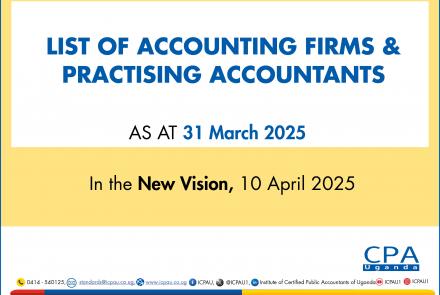By Abraham Malinga
The Institute of Certified Public Accountants of Uganda (ICPAU) has pronounced itself on the adoption of the IFRS Sustainability Disclosure Standards in Uganda.
This follows the issuance of a comprehensive global baseline of disclosure standards by the International Sustainability Standards Board (ISSB). The goal is to facilitate consistent and comparable disclosures on risks and opportunities related to sustainability and climate, referred to as IFRS S1 and IFRS S2, respectively. The IFRS Sustainability Disclosure Standards address longstanding reporting challenges, equipping organisations and investors to better understand performance and comply with the ever‑evolving regulations.
For Uganda, the adoption of the standards is set to revolutionise how organisations report on sustainability and climate-related risks, aligning the country with global best practices.
Speaking at the 29th ICPAU Annual Seminar on 4 September 2024, the President of ICPAU, CPA Josephine Ossiya noted the rationale for adoption as follows:
- Improve the availability of reliable, comparable, cost-effective, and decision-useful information on material sustainability risks and opportunities of organisations.
- Promote full disclosure of information material to investors’ decisions to ensure investor protection.
- Enable the use of other complementary reporting frameworks, such as the Global Reporting Initiative (GRI), to meet the information needs of different stakeholders.
- Improve domestic entities’ access to foreign capital markets and encourage foreign direct investment including access to green financing.
- Support availability and flow of sustainability information across the supply chain.
Dr Ndidi Nnoli-Edozien, a member of the International Sustainability Standards Board (ISSB), who served as the keynote speaker at the Annual Seminar underscored the significance of the development, highlighting Africa’s influential role in shaping sustainability reporting.
“The adoption of these standards marks a significant milestone for Uganda’s corporate sector,” said Dr Nnoli-Edozien.
“It’s not just about compliance — it’s about ensuring that organisations in Uganda are part of the global movement towards more sustainable and transparent practices,” she added.
ICPAU’s leadership in driving this adoption signals its commitment to fostering an environment where consistent and comparable sustainability reporting becomes the norm. Organisations will be required to disclose key information on their sustainability strategies, climate-related risks, and opportunities—critical for investors seeking to make informed decisions.
ICPAU's involvement also means that Uganda joins 23 other African nations in adopting the ISSB standards, reinforcing the continent's growing voice in global sustainability discussions. Dr Nnoli-Edozien noted the significance, stating, “Africa’s voice has been absolutely pivotal in shaping these standards and we are proud to see Uganda take a leading role in this effort.”
To ensure a smooth transition, the ISSB is committed to offering capacity-building support to help businesses integrate these standards effectively. Whether through voluntary or regulatory adoption, the ISSB will provide guidance to ensure that the standards are implemented in a cost-effective and meaningful way.
ICPAU will continue to work with other industry players, regulators, development partners and other stakeholders to ensure full preparedness towards compliance with the new standards.
The Uganda Integrated Reporting Committee working with the Professional Standards Committee of ICPAU Council will provide support to enhance the capacity of preparers and users of financial reports in interpreting and relaying sustainability and climate change related disclosures.
ICPAU will also issue the finalisation and Implementation guidance (roadmap) on adopting the Sustainability Disclosure Standards upon the conclusion of the ongoing public consultation.
CPA Ossiya emphasised the need for collaborative efforts in the adoption process.
“I call upon all entities represented here, especially those that have been identified by Council to drive the implementation of the standards,” said CPA Ossiya.
END.


